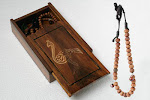By Shaykh Fadhalla Haeri
Introduction
This sûrah (chapter) is placed at the beginning of the Qur`an because it signifies the opening of knowledge and so the victory over ignorance. If, in the direction we are taking, there is no door, then we have reached our target – we have won.Fatiha, means to open, reveal, imbue, conquer. This sûrah is so named because if you follow it in your heart, you will be victorious. You will conquer and an opening will come to you.
A COMMENTARY ON THE QUR`AN
Chapter 1: Surat Al-FatihaThe Opening
In the name of Allah,the Beneficent, the Merciful
Al hamdu lillahi rabb il alamin.
Hamd, is praise. Praise comes if there is knowledge. You can only praise something if you have knowledge of it. Knowledge of something is an aspect of experience. You praise the rabb, the lord-sustainer. Rabba, means to be master of, to have command over. It also means to raise and bring up. Rabb is the attribute of that entity which brings what is under its domain up to its full potential, towards the ultimate end which is huwa, He, because it has come from Him, from Allah.
Al hamdu lillahi rabb il alamin.
Hamd, is praise. Praise comes if there is knowledge. You can only praise something if you have knowledge of it. Knowledge of something is an aspect of experience. You praise the rabb, the lord-sustainer. Rabba, means to be master of, to have command over. It also means to raise and bring up. Rabb is the attribute of that entity which brings what is under its domain up to its full potential, towards the ultimate end which is huwa, He, because it has come from Him, from Allah.
We said that when you praise the Ultimate, you must have some knowledge of it. That knowledge could be that of avoiding the non-Ultimate, which is what we are trying to do now. The way to that knowledge is by avoiding that which is unreal, unconducive, unfulfilling; that which does not permanently rehabilitate our hearts.
Up to a certain point, it is alright to praise an aspect of it since we do not have complete cognizance of rabb. If we are true to ourselves, we aim for the ultimate in everything. We only want to praise the Ultimate.
Real praise belongs only to the Lord-sustainer, and that which sustains the foundation of Tawheed (Unity). When you say, Al hamdu lilla, you are only stating the fact that praise is indeed for Allah. Furthermore, you are only able to praise in the first place because you mirror Allah and His Attributes, since you are the created being, having been created by the Creator, Allah. When you abuse the use of hamd, instead of shukr, you reveal your own shatteredness, for if you have truly witnessed that, La ilaha il Allah, you will understand that Allah's mercy comes not only in bast, expansion, but also in qabd, constriction, and you will recognize that above all else Allah is truly ar Rahman ar Rahim, so that every state reflects the mercy of Allah. This explains why it says: Al hamdu lillahi rabb il alamin, Alamin, encompasses all states, all worlds, in the seen and the unseen, in sleep and in wakefulness, here and in the hereafter.
The man of greater perception sees the rabb, Sustainer, even in times of constriction. To use hamd as an expression of a mood or feeling is shirk. Praise is for Allah at all times and under all circumstances. Hamd does not allow for the separation between you as a praise giver and the object of praise: you merely echo hamd.
Ar-Rahman ar-Rahim
The characteristics of the Lord whom we love and adore are ar-Rahman ar-Rahim, the all-beneficent, the all-compassionate. There is only mercy, but we do not see it because of our ignorance, expectations, and desires which only arise from the use of our intellect. Was the mercy not there when you were in your mother's womb? You stayed there for nine months and yet you were unequivocally content. It is the mercy of Creation that we are able to die, so that there may be breathing and standing space for others to come. It is only we who interfere. It is the ego, the nafs, the vanity of expectation which frustrates and sabotages our recognition of Allah's mercy. It is the evil I which we hear whispering in our ear. Shaytan is only a name. He too is from the Creator. If you know how to tackle Shaytan, then you would see nothing other than ar-Rahman. There is a cult in the Middle East of some two to three million people that worship Shaytan. They say that we know the Lord through Shaytan, and that at the Yowm al Qiyama, Shaytan will be forgiven because he has been testing all the good ones and the bad ones. They say he will be the first to be forgiven. If you see anything other than mercy, it is your own doing. It is your own expectations, desires and illusions. You yourself are the author.
Maliki yowm ad Deen
Malik means owner, master. We come from the Owner. We own nothing, but are all owned. Yowm ad Deen: the day of the Deen. Yowm is not only a day, but also a span of time. Deen, life-transaction, finds its root in dana, to owe, be indebted to. It is the debt of man to want to recognize reality. It is incumbent upon everyone of us to know how to pay the debt upon us.
The deen with Allah is Islam. It is a life-transaction. Our way of behaving towards ourselves and towards others is deen. It is the way of correct transaction. But if you cannot discipline yourself, you cannot be of any use to anybody else. If interaction is not at least two-dimensional, nothing will work. You will only accumulate more wealth and cultivate more attachment. Eventually, you will be toppled over. Therefore, you have to exercise yourself in order to discipline yourself. The inner discipline begins with the outer discipline. This is the meaning of deen. The outer is easier because if you yourself do not stop from overshooting the limits, someone else will. It is the inner that is more difficult, so we start with the outer in order to gain the inner meaning. We go from the gross to the subtle.
Iyyaka na'budu wa iyyaka nasta'in
Once you recognize that you are in love and you are worshipping the rabb, you admit it openly, we worship You and we depend upon You. If you are worshipping and you are in love, then you are in adoration. Abada, is to worship, adore, serve, and in its second form, it means to make accessible. You depend upon the Merciful. This is only meaningful if there is knowledge, for otherwise it can be considered a tyranny.
Ihdina as Sirat al-Mustaqim
Show us the direct way. A straight line is the shortest distance between two points. A straight line is also one point traveling in only one direction. Therefore, you ask to be shown the most direct route towards this knowledge.
Sirat al ladhina an'amta 'aleyhimGhayr il maghdhubi 'aleyhim wa`l ad dalin
Sirat al ladhina an'amta 'aleyhim, is the way of those upon whom delight has been bestowed, not those upon whom anger burns, Na'ma is delight, happiness. There is no anger in this life. If you do not see mercy, then you have brought darkness upon yourself. Your ignorance is not the fault of someone else. If you do something inane and as a consequence harm comes to you, then Reality is angry with you, angry in the sense that you are not in unification with it. Anger implies a high degree of discontent on the part of one entity with another, which leads to severing of the relationship between the two.
There is only Allah. There is only Reality. Consequently, there is no place for superstition. It is you who decide whether Allah is angry with you. Rahma must encompass everything. Your loss is, in fact, within that rahma. The condition you are in is appropriate because you have brought it about by your heart. This is cosmos, not chaos. It is total ecology. As human beings, we are all occasionally at a loss and often unsure. It is for this reason that we have to keep healthy and correct companionship. Existentially, we need guidance.
Surat al Fatiha can be divided into three sections. The first section includes the opening line up to Maliki yowm ad Deen. It is an exposition of reality. You find yourself awakened suddenly and you say: I am in gratitude, praise to Allah, Who has these attributes. You are inspired after having been in wilderness and bewilderment, so you say, Al hamdu lillahi rabb al 'alamin, out of contentment and sanity. In the next section, (from Iyyaka na'budu wa iyyaka nastain to Ihdina as-Sirat al-Mustaqim), you are the adorer, the abd. This now is transaction and demand. It is a request, it is action. In this section the heart cries out. The third part is like the echo of reality in order to confirm what you are saying and to answer your question.
Surat al Fatiha is the most important Sura in the Qur`an. If it is completely absorbed, and if every word comes from a pure heart, you will cease to talk about opening and you will recognize that the vastness of Allah's mercy is never-ending, so you can only strive to increase, for after the constriction of ignorance, there can only come the expansion of knowledge.
End of the Surah










No comments:
Post a Comment